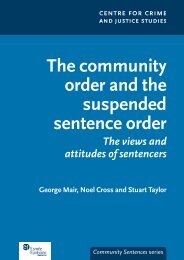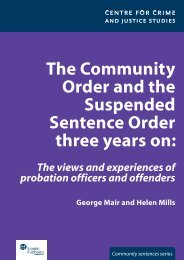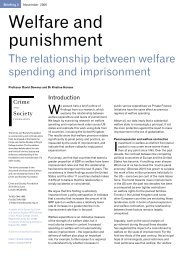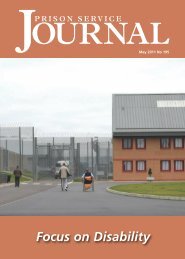PRISON SERVICE
PRISON SERVICE
PRISON SERVICE
- No tags were found...
You also want an ePaper? Increase the reach of your titles
YUMPU automatically turns print PDFs into web optimized ePapers that Google loves.
Perrie Lectures 2010Interview: Stephen ShawStephen Shaw was the Prisons and Probation Ombudsman for England and Wales from 1999 to 2010.He is interviewed by Martin Kettle who works for HM Inspectorate of Prisons.Stephen Shaw CBE is the recipient of the Perrieaward 2010. He was appointed PrisonsOmbudsman in October 1999. His role wasextended in September 2001 to take incomplaints against the National ProbationService (NPS) from those under supervision in thecommunity and the post was renamed as thePrisons and Probation Ombudsman for Englandand Wales. . His remit was further extended totake in complaints from those in immigrationdetention in October 2006.Initially established in order to provide someindependent oversight of complaints, during his timein office, the work and responsibilities of the officehave expanded significantly. Most notably, from April2004, the Ombudsman’s office has been responsiblefor the investigation of all deaths in prisons andimmigration removal centres, as well as the deaths ofresidents of NPS hostels (approved premises).As Ombudsman, he conducted a range ofinvestigations in a personal capacity, including theinquiry into a riot an immigration centre, aninvestigation into the death of Harold Shipman, andthe first public inquiry to be held into a near death inprison. He also served as one of two independentmembers of the Parole Board’s review committee thatconsiders the cases of released prisoners who havecommitted serious further offences.Prior to becoming Prisons Ombudsman, he wasdirector of the Prison Reform Trust (PRT) charity for18 years.In April 2010 he left his post and took up a newrole as the first Chief Executive of the Office of theHealthcare Adjudicator. This office has beenestablished in order to create a clear separationbetween the power to investigate and the power toadjudicate concerns about health professionals.He has written widely on both criminal justice andeconomic issues. His latest publication is entitled FiftyYear Stretch: Prisons and Imprisonment 1980 — 2030and was published in 2010 by Waterside Press.MK: Many congratulations on receiving thePerrie Award 2010, in recognition of your manyyears of work to improve the criminal justicesystem.SS: I was very pleased when I found that not onlywas I the recipient of the Perrie Award, but also thatas a concomitant of this I had this opportunity tospeak to the readers of PSJ. I remarked when I wasgiven the Award that it is the sort of award that isgiven to people at the end of their careers. I comparedit with what happened at the Emmys, the musicindustry awards, this year. They had given one toAndre Previn, aged 81, one to Leonard Cohen, aged75, and one to Bobby Darin, who would have been amere 74 but for the unfortunate fact that he died inthe 1970s. So to receive the Perrie award wasbittersweet, and I reject the implication that my bestdays may be behind me. Still, I was delighted.MK: The Award is mainly in recognition ofyour years as the Prisons and ProbationOmbudsman. Before that you were wit thePrison Reform Trust for 18 years.SS: Yes, two jobs in 30 years. I was described onsome left-wing website as a careerist, and I thoughttwo jobs in 30 years was an interesting definition ofcareerism.MK: Which was the better of those two jobs?SS: Each in its time, really. I don’t envy peoplerunning pressure groups and interest groups thesedays; I think it’s a much trickier business. When Istarted all those years ago at the PRT, newspaperswere literally based in Fleet Street, and they wouldtake a huge amount of pressure group material. Youcould (and I did) run or drive up and down Fleet Streetwith a photocopied press notice and hand it in at thedesk with a reasonable chance that the next day itwould get in. I remember one incident where it wasthe first time that the government of that timeproposed intermittent custody — we used to call themawayday prisons. We thought it was a daft idea. Iwrote a press notice saying so, for PRT and also for aseparate campaigning body. As I was driving home,just after midnight, on the BBC radio in my old Datsuncame on saying that the government is proposingintermittent custody, and already the idea has beencriticised by two organisations, PRT and this other one— and that was just me at a typewriter. It was mucheasier then. Now the serious newspapers wantexclusives, they are happy to report crime but less soserious discussion about crime and how to deal with itbecause other matters, often consumer-based, havetaken the space. If you do an analysis of what goes38Prison Service JournalIssue 192











